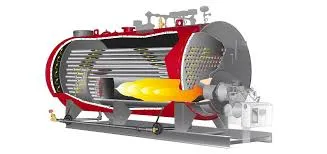
Feb . 12, 2025 13:17 Back to list
Oil-fired hot water boiler
Hot water boilers are essential components in countless industrial, commercial, and residential setups, delivering the necessary heat and comfort required for a range of applications. Central to the efficiency and performance of any hot water boiler system is the precise control of water temperature. Managing this aspect effectively not only ensures optimal performance but also extends the appliance's lifespan, improves safety, and enhances energy efficiency.
For those managing larger systems, integration with building management systems (BMS) can provide an additional layer of control. A BMS allows building operators to monitor and adjust the boiler's temperature remotely, ensuring that the system settings align with overall building energy strategies. This holistic approach not only simplifies management but can also pinpoint irregularities and inefficiencies in real-time, promoting rapid response and maintenance. In the realm of residential applications, smart home technology is increasingly adopted to manage hot water boiler systems. Smart thermostats revolutionize the way users interact with their heating systems, providing remote access via smartphone applications and the ability to learn user preferences over time, adjusting automatically for maximum comfort and efficiency. Reliability and trust in the temperature control systems are reinforced by adherence to stringent industry standards and certifications. Look for boilers and accessories that meet recognized standards such as Energy Star, ASME, or CE, which assure a level of quality, safety, and environmental responsibility. Expertly installed systems by qualified professionals further bolster performance reliability, ensuring every component functions harmoniously within the system's framework. To maintain these systems in peak condition, regular maintenance and periodic professional inspections are invaluable. Maintenance routines should include checking and calibrating thermostats, cleaning and inspecting burners and heat exchangers, and assessing overall system performance. By adhering to these practices, the risk of unexpected breakdowns is minimized and operational efficiency is maximized. In conclusion, controlling the temperature of a hot water boiler system is a multifaceted endeavor that plays a crucial role in achieving desirable outcomes in comfort, efficiency, and reliability. By harnessing the advanced features of modern control systems, implementing weather compensation, minimizing boiler cycling, and integrating with smart technologies and building management systems, users can optimize their systems to the fullest. Adherence to recognized industry standards and regular maintenance fortify the system’s dependability, thereby reflecting the expertise, authority, and trustworthiness necessary for sustainable boiler operation.


For those managing larger systems, integration with building management systems (BMS) can provide an additional layer of control. A BMS allows building operators to monitor and adjust the boiler's temperature remotely, ensuring that the system settings align with overall building energy strategies. This holistic approach not only simplifies management but can also pinpoint irregularities and inefficiencies in real-time, promoting rapid response and maintenance. In the realm of residential applications, smart home technology is increasingly adopted to manage hot water boiler systems. Smart thermostats revolutionize the way users interact with their heating systems, providing remote access via smartphone applications and the ability to learn user preferences over time, adjusting automatically for maximum comfort and efficiency. Reliability and trust in the temperature control systems are reinforced by adherence to stringent industry standards and certifications. Look for boilers and accessories that meet recognized standards such as Energy Star, ASME, or CE, which assure a level of quality, safety, and environmental responsibility. Expertly installed systems by qualified professionals further bolster performance reliability, ensuring every component functions harmoniously within the system's framework. To maintain these systems in peak condition, regular maintenance and periodic professional inspections are invaluable. Maintenance routines should include checking and calibrating thermostats, cleaning and inspecting burners and heat exchangers, and assessing overall system performance. By adhering to these practices, the risk of unexpected breakdowns is minimized and operational efficiency is maximized. In conclusion, controlling the temperature of a hot water boiler system is a multifaceted endeavor that plays a crucial role in achieving desirable outcomes in comfort, efficiency, and reliability. By harnessing the advanced features of modern control systems, implementing weather compensation, minimizing boiler cycling, and integrating with smart technologies and building management systems, users can optimize their systems to the fullest. Adherence to recognized industry standards and regular maintenance fortify the system’s dependability, thereby reflecting the expertise, authority, and trustworthiness necessary for sustainable boiler operation.
Share
Latest News
-
High-Efficiency Commercial Oil Fired Steam Boiler for Industry
NewsJul.30,2025
-
High-Efficiency Biomass Fired Thermal Oil Boiler Solutions
NewsJul.30,2025
-
High Efficiency Gas Fired Thermal Oil Boiler for Industrial Heating
NewsJul.29,2025
-
High-Efficiency Gas Fired Hot Water Boiler for Sale – Reliable & Affordable
NewsJul.29,2025
-
High Efficiency Biomass Fired Hot Water Boiler for Industrial and Commercial Use
NewsJul.29,2025
-
High-Efficiency Biomass Fired Hot Water Boiler for Industrial Use
NewsJul.28,2025
Related PRODUCTS
Copyright © 2025 HEBEI HONGZE BOILER MANUFACTURING CO., LTD. All Rights Reserved. Sitemap | Privacy Policy






















